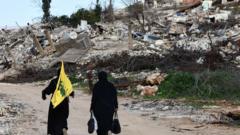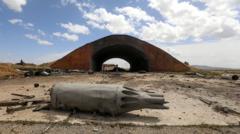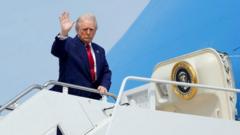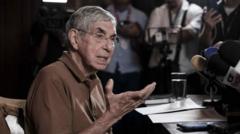Recent airstrikes by Israel targeting military sites in Syria signal escalating tensions, with both nations vying for influence in the region amidst a complex geopolitical landscape.
**Growing Tensions Between Israel and Turkey in Syria**
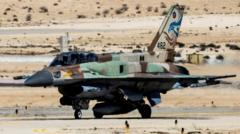
**Growing Tensions Between Israel and Turkey in Syria**
The conflict between Israel and Turkey intensifies as military actions raise fears over Syria's stability.
Israel has ramped up air strikes on Syrian military installations in response to Turkey's increasing presence and influence, posing a significant challenge to the nascent government in Syria. On Wednesday night, Israeli forces targeted multiple military sites, including two major airports – Hama and T4 near Homs, resulting in extensive damage and casualties. Syria's government condemned the attacks, with reports indicating that the Hama base was nearly decimated, leading to the deaths of defense ministry personnel.
Experts suggest that while the air strikes were executed in Syria, their underlying objective was to challenge Turkey's growing military footprint. Following the bombings, Israeli officials criticized Turkey's involvement in Syria, labeling it destructive. Furthermore, Israel's defense minister issued strong warnings to Syria's interim president Ahmed al-Sharaa against hosting "hostile forces," implying repercussions for any cooperation with Turkey.
Currently, Turkey is exploring a defensive agreement with Syria's new leadership, amidst speculation of Turkish aircraft and defense systems being stationed at strategic locations such as T4 and Aleppo. Israel's military tact seems to be carefully calibrated; while launching extensive strikes on Hama, the softer engagements around the T4 facility suggest an awareness of potential escalations.
The relationship between Israel and Turkey has deteriorated sharply since the onset of the Gaza conflict earlier this October, leading to trade restrictions from Turkey and accusations against Israel of committing human rights violations. In a responsive move, Turkey condemned Israeli actions and highlighted the threat posed by their military interventions.
Despite ongoing hostilities, Turkey’s foreign ministry emphasized its desire to avoid direct confrontation with Israel, affirming that Syria should independently dictate its policies with respect to Israel. Ahmed al-Sharaa, Syria's new leader, has attempted to project an image of peace and cooperation, even hinting at the possible normalization of relations with Israel in the future.
Syria has faced persistent Israeli military interventions aimed at disrupting any possible threats, particularly with the former regime's arsenal. Israel maintains its stance of securing its northern borders by monitoring Syria's military movements. In recent incursions, civilian casualties have been reported, prompting calls for jihad against Israeli forces from local mosques.
As Syria transitions post-Assad, internal divisions remain susceptible to both regional and external exploitation, complicating efforts for unity. With heightened military presence and ongoing violence, there are fears that Syria could again become a battleground for competing foreign interests. The aftermath of Assad’s fall has not led to anticipated diplomatic thawing; rather, it has kindled concerns of escalating conflict fueled by foreign powers.
Experts suggest that while the air strikes were executed in Syria, their underlying objective was to challenge Turkey's growing military footprint. Following the bombings, Israeli officials criticized Turkey's involvement in Syria, labeling it destructive. Furthermore, Israel's defense minister issued strong warnings to Syria's interim president Ahmed al-Sharaa against hosting "hostile forces," implying repercussions for any cooperation with Turkey.
Currently, Turkey is exploring a defensive agreement with Syria's new leadership, amidst speculation of Turkish aircraft and defense systems being stationed at strategic locations such as T4 and Aleppo. Israel's military tact seems to be carefully calibrated; while launching extensive strikes on Hama, the softer engagements around the T4 facility suggest an awareness of potential escalations.
The relationship between Israel and Turkey has deteriorated sharply since the onset of the Gaza conflict earlier this October, leading to trade restrictions from Turkey and accusations against Israel of committing human rights violations. In a responsive move, Turkey condemned Israeli actions and highlighted the threat posed by their military interventions.
Despite ongoing hostilities, Turkey’s foreign ministry emphasized its desire to avoid direct confrontation with Israel, affirming that Syria should independently dictate its policies with respect to Israel. Ahmed al-Sharaa, Syria's new leader, has attempted to project an image of peace and cooperation, even hinting at the possible normalization of relations with Israel in the future.
Syria has faced persistent Israeli military interventions aimed at disrupting any possible threats, particularly with the former regime's arsenal. Israel maintains its stance of securing its northern borders by monitoring Syria's military movements. In recent incursions, civilian casualties have been reported, prompting calls for jihad against Israeli forces from local mosques.
As Syria transitions post-Assad, internal divisions remain susceptible to both regional and external exploitation, complicating efforts for unity. With heightened military presence and ongoing violence, there are fears that Syria could again become a battleground for competing foreign interests. The aftermath of Assad’s fall has not led to anticipated diplomatic thawing; rather, it has kindled concerns of escalating conflict fueled by foreign powers.

